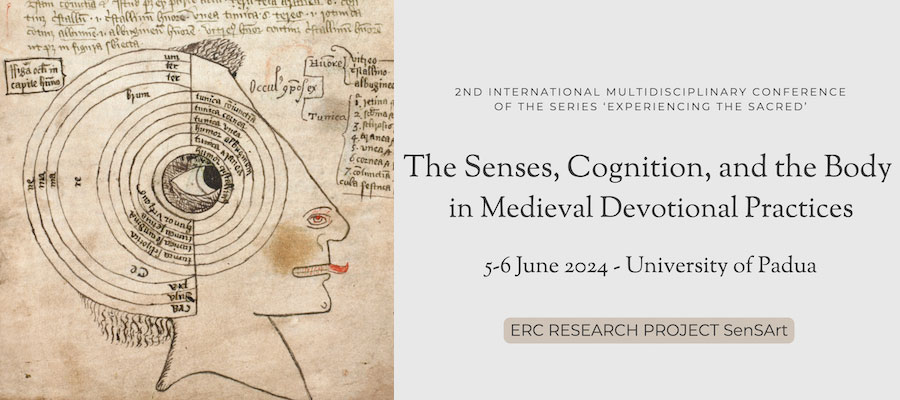The Senses, Cognition, and the Body in Medieval Devotional Practices, 2nd International Multidisciplinary Conference of the Series ‘Experiencing the Sacred’, University of Padua, June 5–6, 2024
Starting with the 12th century, the upsurge of interest in Christ’s humanity and the more intense focus on his corporeal nature fostered more individualized and embodied approaches to spirituality, as emphasized by Caroline Walker Bynum. The human body of the believers themselves became a focal point, as a tool through which individuals could aspire to connect with the divine. Mary Carruthers and Michelle Karnes have illustrated that the incorporation of Aristotelian theories into Christian thought by theologians such as Thomas Aquinas played a crucial role in shaping these changing paradigms. They provided a new framework for understanding the moral and spiritual interpretations of the senses, the body and cognitive processes. This intellectual shift created innovative avenues for communicating complex spiritual concepts through somatic experiences, making the divine more accessible and even tangible. Over the centuries, the dissemination of these ideas among the laity through sermons, as noted by Giuseppe Ledda, and devotional literature such as the Meditationes Vitae Christi, led to the creation of a widespread culture of sensation. As a result, the integration of sensory and bodily experiences into religious practices became a shared cultural phenomenon, shaping the way people perceived and interacted with their faith.
To better grasp the relations between the senses, the body and the mind we propose to incorporate recent developments in the field of cognitive sciences. The intersection between cognitive sciences and medieval studies is a very recent and still rare occurrence (Blud & Dresvina, 2010), yet it holds promise. For the purpose of the present conference, we are interested in the fact that in cognitive sciences, the dynamics of interaction among mind, body, and material world are now deemed crucial to understand mental states and processes. Cognition is indeed understood to be embodied (it does not depend solely on the brain but is also influenced by the body) and embedded, meaning it is inextricably linked to its social and material environment. This interpretative framework proves particularly useful in analyzing medieval religious practices, where material items, environments, and individual experiences were inextricably connected.
The interdisciplinary focus of this conference, integrating sensory studies, material culture studies, cognitive studies, and historical research, provides a rich platform for understanding the profound changes in religion during the medieval period. By exploring somatised spiritual experiences, the conference aims to shed new light on the intricate ways in which the senses, cognition, and the body were engaged in devotional practices, emphasizing the multisensory nature of medieval spirituality.
We welcome abstracts for 25-minute papers, in English or Italian.
Desirable themes include (but are not limited to):
- The intersection of material objects, the body, and immaterial practices in devotional contexts;
- The role of the body, emotions and cognition in the sacred spaces and its perceptions;
- Living and dead bodies in religious spaces and practices;
- Touching and dressing bodies in sacred spaces;
- The role played by the senses in cognitive processes, for example the use of the body and the senses as metaphors to facilitate the understanding of religious concepts;
- Individual, collective, and gendered forms of embodied and embedded devotion;
- The agency of objects in extended forms of cognition in religious contexts;
- Theories (medical, physiological, theological, etc.) on the body and mind in medieval culture.
This conference is organised by the ERC research project SenSArt – The Sensous Appeal of the Holy. Sensory Agency of Sacred Art and Somatised Spiritual Experiences in Medieval Europe (12th-15th century), Grant Agreement nr. 950248, PI Zuleika Murat, Università degli Studi di Padova.
